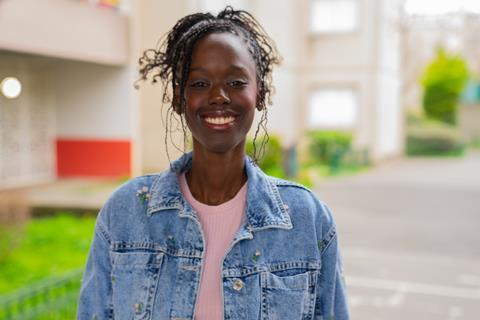How first-time filmmaker Ramata-Toulaye Sy landed a coveted slot in Cannes’ main Competition with Banel & Adama.

At 36, Ramata-Toulaye Sy is the youngest director in Cannes Competition this year and brings her first-ever feature Banel & Adama to contend alongside some of the world’s most acclaimed auteurs.
The filmmaker graduated from top French film school La Fémis in 2015. She co-wrote two features before directing her first short film Astel, which won prizes at Toronto and Clermont-Ferrand, and was shortlisted for a César award. Banel & Adama is sold in the market by Best Friend Forever (BFF).
So when did you first discover cinema?
I’m the daughter of Senegalese parents — my mother was a cleaning lady and my father a factory worker, and they raised us in the suburbs of Paris. Though they were both illiterate, education was important to them and they pushed us to read and experience culture. I watched films but mostly on TV, popular cinema and blockbusters. At university, I [majored in] cinema, loved it and went to La Fémis.
Were you surprised to be selected for Cannes Competition?
We sent the unfinished film in early March. As soon as they saw it, the festival called the next day to say they had selected it, but for Un Certain Regard. We were thrilled. Then, at midnight, the night before the press conference, they called to say that they’d kept it secret the whole time but the film would be in Competition. They normally call the producers or distributors, but they called me. I called the producers, Tandem distribution, and BFF, the sales team, and even they didn’t know. It was a happy surprise for all of us.
How would you describe a Ramata-Toulaye Sy film?
A film needs to be spectacular, but each person has their own definition of what spectacular means. I’m passionate about art and painting, so I always create what I think of as cinematographic paintings. A Ramata-Toulaye Sy film is an artistic film. There are poetic voiceovers, visual paintings, a blend of different forms of art. I try to create things, to evoke sensations with dialogue or visually.
It may sound like an overnight success story, but you wrote the script a long time ago.
I wrote the script during my fourth year at La Fémis, as part of my graduation project. A producer — Eric Névé at La Chauve-Souris — bought it. I said to him that I didn’t want to direct it, both because I was passionate about literature and writing, and I also didn’t feel ready to direct in 2014. Then he died, just before Covid. Eric Névé was my mentor and a friend. His wife, Maud Leclair-Névé, took over the company and told me the screenplay was so dear to Eric that I should direct it as an homage to him.
What were some of the challenges of financing and shooting?
Financing was the easy part: CNC, Arte and Canal+ supported us from the beginning. The hardest thing was the shoot itself [in Fouta-Toro, Senegal]. It was almost 500C, and there were giant sandstorms and rain. The cast and crew got sick because of the harsh conditions. Our lead actress had to go to hospital twice.
Why was it important to tell this Africa-set story?
When I wrote the screenplay in 2014, the stories I saw in African cinema were all about poverty, politics and war. Genre films were few and far between. I wanted to write a universal story about Africans that would speak to audiences in the rest of the world.
How do you want audiences to feel after seeing the film?
Banel & Adama is a love story, but it’s a pretext to write a story about a woman and the place of the woman in contemporary society. I’m obsessed with this theme.
How do you feel about showing the film for the first time in Cannes?
Everyone is asking if I’m stressed — but I’m not because I don’t know what to expect since I’ve never been to Cannes with a film. Being in Competition, I know that some people won’t like it. That’s okay, that’s normal, that’s what makes life interesting. If there is no debate, it’s not art.
I grew up in the Paris projects, my parents were immigrants who couldn’t read or write. They sacrificed for us and my generation has had to sacrifice for all we wanted to do. Nothing I’ve done has been easy, but the film is in Competition. I’ve already won.

























No comments yet